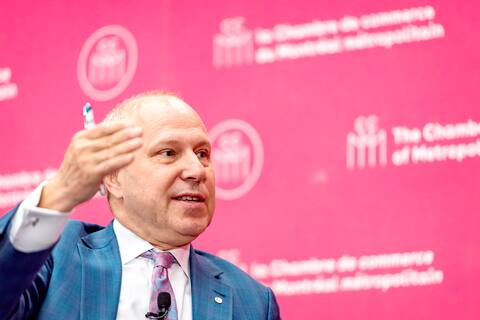
Finally, Elon Musk might not have it all wrong. Like Twitter’s boss, the management of the Chamber of Commerce of Metropolitan Montreal (CCMM) has announced the end of regular teleworking and now expects its staff to return to full-time office work.
About 105 employees of the House were informed about this decision yesterday morning. From 1er In May, that is to say, in a dozen days, the most important group of Montreal businessmen wants to turn its premises in the World Trade Center into the “common office of its employees” as before.
“It is a return to work full time in the city center, summed up in the interview of its CEO Michel LeBlanc. Full time, however, with all the flexibility that the experience of remote work allowed us to experience during the pandemic, he immediately nuances.
A temporary cry
Over the course of a year, the Chamber began the process of gradually returning its face-to-face teams. Today, its staff are required to report to the office at least three days a week, two of which are determined by management. Beyond this threshold – from the fourth day – employees benefit from payment by the employer for their monthly public transport card.
“There was some grumbling at the beginning, he admits. But while some threatened to leave, others came to work with us because they couldn’t be alone at home anymore. Many people – especially early in their careers – understand that working remotely means missing out on learning. [ce] In the long run, there is a risk of limiting their professional opportunities.
While Quebec has seen delays compared to other major cities in the country, the chamber’s big boss said he sees appetite among business leaders here for some return to pre-pandemic practices. Two weeks ago, Royal Bank of Canada announced that its employees at its Toronto headquarters will no longer need their presence in the office up to four days a week to remain competitive.
Stop being afraid
He also expects many other companies to emulate the chamber’s approach in the coming weeks or months. In doing so, it invites all levels of government (federal, provincial and municipal), which are particularly lagging behind the private sector in this regard, to adopt policies without delay to expedite the return of their employees to the workplace.
According to Michel LeBlanc, more and more organizations are seeing a real decline in group productivity and competitiveness against competitors – despite the perception that employees are delivering performance comparable to or better than what they previously delivered. For example the United States, where telework is not so widespread.
“For companies, I tell them to stop panicking. You will not lose your employees. On the contrary, by asking them to return to the office, to do it in a normal office, you will strengthen your organizational culture, your ability to integrate newcomers and your staff retention. You will, on the contrary, not lose ; Save what you learn and take steps to stay in the race.








More Stories
Sportswear: Lolle acquires Louis Garneau Sports
REM is still innovative enough to foot the bill
A trip to the restaurant with no regrets for these customers